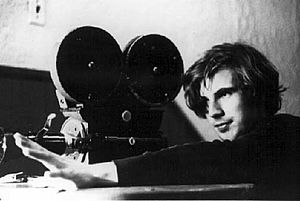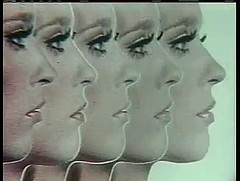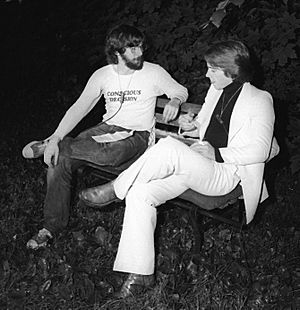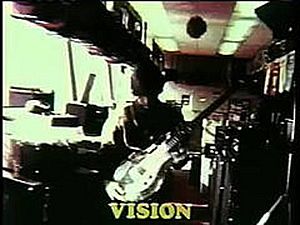Wheeler Winston Dixon facts for kids
Quick facts for kids
Wheeler Winston Dixon
|
|
|---|---|
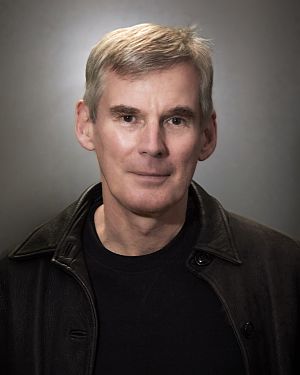
Wheeler Winston Dixon in 2016
|
|
| Born | March 12, 1950 |
| Nationality | American |
| Alma mater | Rutgers University (BA, PhD) |
| Occupation | Film critic, film historian, filmmaker, scholar |
|
Notable work
|
A Short History of Film, A History of Horror Experimental films |
| Partner(s) | Gwendolyn Audrey Foster |
Wheeler Winston Dixon (born March 12, 1950) is an American filmmaker and scholar. He is an expert on film history, theory and criticism. His scholarship has particular emphasis on François Truffaut, Jean-Luc Godard, American experimental cinema and horror films. He has written extensively on numerous aspects of film, including his books A Short History of Film (co-authored with Gwendolyn Audrey Foster) and A History of Horror. From 1999 through the end of 2014, he was co-editor, along with Gwendolyn Audrey Foster, of the Quarterly Review of Film and Video. He is regarded as a top reviewer of films. In addition, he is notable as an experimental American filmmaker with films made over several decades, and the Museum of Modern Art exhibited his works in 2003. He taught at Rutgers University, The New School in New York, the University of Amsterdam in the Netherlands, and as of May 2020, is the James E. Ryan professor emeritus of film studies at the University of Nebraska in Lincoln.
Early years
Dixon was born in 1950 in New Brunswick, a city in New Jersey halfway between New York City and Philadelphia. He grew up in Highland Park, New Jersey, and graduated from Highland Park High School in 1968. In the late 1960s, he was a member of New York's "underground" experimental film scene while working as a writer for Life Magazine and Andy Warhol's Interview magazine. In 1970, he co-founded the musical group Figures of Light. In London, he participated in Arts Lab in Drury Lane, making and screening short films. Returning to the United States, he worked with an experimental Los Angeles-based video collective called TVTV. Dixon received a Ph.D. in English from Rutgers University in 1982.
Experimental films
During the course of several decades, Dixon made numerous experimental films. In 1991, along with filmmaker Gwendolyn Audrey Foster, he made a documentary entitled Women Who Made the Movies. In 1995, in France, he made a film entitled Squatters. In 2003, the Museum of Modern Art acquired all of his experimental films, including the following:
- Quick Constant and Solid Instant (1969)
- Madagascar, or, Caroline Kennedy's Sinful Life in London (1976)
- Serial Metaphysics (1972)
- What Can I Do? (1993)
His films have also been screened at the British Film Institute, the Whitney Museum of American Art, the Jewish Museum, The San Francisco Cinématheque, Arts Lab, The Collective for Living Cinema and The Kitchen Center for Experimental Art. In March and April 2018, along with Gwendolyn Audrey Foster, the BWA Contemporary Art Gallery in Katowice, Poland, presented a month long retrospective of Foster and Dixon's new video work. In May 2018, he presented a screening of his videos, along with the work of Gwendolyn Audrey Foster and Bill Domonkos at The Museum of Human Achievement in Austin, Texas. In the summer of 2018, he had a one-person show at Filmhuis Cavia in Amsterdam, and his "Catastrophe Series" of ten videos were screened as part of a group show at Studio 44 Gallery in Stockholm, Sweden. In the fall of 2018, he had a one-person show at La Lumière Collective in Montreal, Canada. In December 2018, he had a one-person show at Studio 44 in Stockholm, and a one-person show at the OT301 Gallery in Amsterdam. In January 2019, his complete video work was collected in the UCLA Film and Television Archive in Los Angeles. On June 23, 2019, he had an invited one person screening of his new digital video work at the Los Angeles Filmforum at the Spielberg Theater.
Personal life
Dixon is the nephew of the artist Nina Barr Wheeler.


